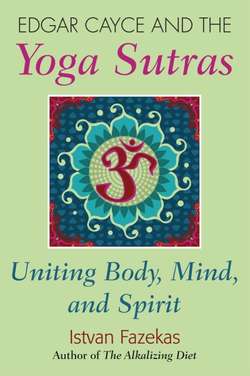Читать книгу Edgar Cayce and the Yoga Sutras - Istvan Fazekas - Страница 18
На сайте Литреса книга снята с продажи.
II. Satya
ОглавлениеIf you abide in My Word [logos, Christ Consciousness] . . . you are truly My disciples. And you will know the truth, and the truth will set you free.
Jesus; John 8:31-32 [KJV; author’s brackets]
Blessed are the pure in heart: for they shall see God.
Jesus; Matthew 5:8 [KJV]
Those who are in that way or attitude of “Let the words of my mouth and the meditation of the heart be acceptable in Thy sight,” are in the way of truth.
262-77
In breaking through from those things that hinder in the material, such as would defile the body, numb the senses or make for impurities in the body, from such abstain. In those that make for love, purity of purpose, of aim, these bring the light of the glory of the Father, who so loved us as to give His Son. In this manner, then, may the will, the call, the understanding, come to thine own self . . .
294-139
[Satya] is the foundation stone of the universe . . . Men and civilizations stand or fall according to their attitude toward truth.
Paramahansa Yogananda6
One does not spiritually succeed as long as they have these three: shame, hatred, and fear.
Sri Ramakrishna
Satya means to be truthful with your words and actions. It does not allow any room for deception, duplicity, or psychological manipulation bolstered by guile or falsehood. This is a high ideal, but the readings’ source stipulates in numerous ways that man’s ways and God’s ways are seldom the same. We need high ideals in order to awaken spiritually. A deep understanding of this breeds satya.
It is a firm verbal and ideological commitment to truthfulness that gives one’s words the power to manifest a new reality, to create what is needed. It is not merely visualizing that manifests something, it is the quality of consciousness of the seeker. If our internal “dial” is tuned to God consciousness, we are better able to manifest what we need, as our needs naturally become simplified and in accord with the Divine plan; we then have the intuitive discrimination to know what is acceptable and unacceptable in the big picture and the will to realize it.
An ideal . . . cannot, should not, will not, be that that is man-made, but must be of the spiritual nature—that has its foundation in Truth, in God . . .
262-11
Mahatma Gandhi made the bedrock of his philosophy the first two yamas—ahimsa and satya—which he termed satyagraha. Look at what he accomplished by giving 100 percent to only two of the ten transformational precepts! As he committed to making them foremost in his personal philosophy, countless others were, and still are, affected by that commitment. This is why the sages declare that the yamas and niyamas have powerful personal and global transformative potential, but only to the degree that we faithfully live them. It can be difficult, but we must not give up on ourselves or one another. What is exponentially more difficult is a life ungoverned by spiritual precepts.
Ultimately, satya means to live in line with “eternal truth.” There are three basic levels to satya:
1. Conscious satya—in which the logical mind finds truthful corroborations in philosophy and other manmade schemes. These relate to many ethical and moral principles to “be honest,” “tell the truth,” and the like. These are important.
2. Subconscious satya—in which the truths are presented in dream visions and intuitive messages. These are sublime.
3. Superconscious satya—in which the truths presented to the seeker come in visions and “paranormal” experiences. These are commonly referred to as “mystical experiences,” and though erroneously labeled as “paranormal,” they are of the most natural manifestations of spiritual awakening.
The ideal intention of satya is to live purity in word and action. To speak one’s “truth” under the guise of cruelty, malice, or malevolence is not satya but a type of ego-induced blindness. One must be truthful while being compassionate, honoring the initial teaching of ahimsa. If you cannot speak your truth and be compassionate, wait to speak until you can. You cannot honor satya and simultaneously defy ahimsa. It does not matter that the “truth” is accurate—if it is conveyed in a malevolent and hurtful manner, it is antithetical to both ahimsa and satya. We all have a responsibility to speak the truth in a compassionate manner if we are to honor the spirit of satya and the yamas as a whole. If we can stay faithful to this, the power of our words can manifest great things.
So few in this world discriminate properly between their want and their need.
Hazrat Inayat Khan
